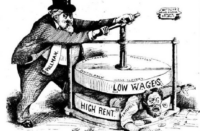Now that we’ve literally reached the business end of the annual GAA season, it is perhaps timely to reflect on the trajectory that Ireland’s pre-eminent sporting, cultural and community organisation appears to have ingloriously embarked upon in recent decades.
Just last month, sporting twitterati and print journos went apoplectic in reaction to the blasphemous observation made by leading GAA pundits on live television (thereby circumventing RTE’s editorial censors) that Cumann Lúthchleas Gael had become a victim of the ravenous and all-consuming capitalism that has come to characterise 21st-century Ireland. The GAA football stalwart Colm O’Rourke even went so far as to posit “more socialism” as a potential remedy for the modern organisation’s ills.
The mainstream bourgeois and corporate media in Ireland are not renowned for a propensity to discuss the political ideology that governs virtually every aspect of our contemporary economic, social and cultural relations. Therefore, when the words “capitalism” and “socialism” were juxtaposed on prime-time television before an audience of over half a million viewers, one could almost hear the collective gasp of a nation unaccustomed to any mention of the two ideologies that have competed for influence in the governance of human society since the middle of the nineteenth century.
The GAA, with about a million members and an increasingly global reach, is, in the words of its most colourful pundit, Joe Brolly, “a sleeping giant, with vast untapped potential to expand our social, cultural and even political work to ensure a better, more just society.” Yet the mushrooming grass-roots hostility surrounding the “Sky Deal,” the “Super 8s,” GPA (a free-market limited company that in turn has enriched a handful of elite players) and creeping professionalism have left the GAA facing what can only be described as an existential crisis.
Brolly, a Dungiven barrister and former all-Ireland medal winner cum enfant terrible of the GAA, has for a considerable time been chronicling and documenting the GAA’s rapid drift to the right. He has become notably more pointed in recent years in his criticism of the GAA hierarchy and its submission to commodification, commercialism, capitalistic relations, and elitism.
While doubtlessly the most prominent critic of the organisation’s subsumption into the neo-liberal world order, Brolly is far from alone among the GAA fraternity in his despondency about the Croke Park authorities’ seemingly unassailable direction of travel.
In a heartfelt and moving article entitled “Paradise Lost” for the blog rabble.ie, Gearóid Ó Riada, himself an all-Ireland winner with Kerry, lamented the GAA’s shift from “an organisation comprised of radical thinkers and idealists who would play a significant part in the nation’s fight for independence . . . towards neo-liberal values and corporate greed.”
As a cross-class nationalist organisation the GAA is hardly renowned for its avant-garde political consciousness-raising or indeed anguished deliberations based on left-right ideological debate. However, the class fissures and political divergences within the “GAA family” are rapidly sharpening and becoming increasingly embittered. As Ó Riada observes, at present there are few areas of Irish life that have not in some way been tainted by greed and self-interest, the GAA being the latest casualty of these poisonous ideologies.
Such observations reflect a deepening concern that capitalism has, even by its own warped standards of morality, gone too far and in the process endangered the cosy alliance of classes that has been bonded for over 130 years by the national movement of the GAA. It’s hard to disagree with Ó Riada’s assessment that the organisation is now beginning to split into a grass-roots faction opposed to the future commodification of the GAA, and officials and corporate bodies seeking solely to profit from high-profile inter-county teams and competitions. Such a split, it is feared, may even lead to the ultimate death of the GAA itself.
It’s difficult also to question his assertion that the use of the term “GAA community” has always been a misleading generalisation that presumes that grass-roots members, governing bodies and parasitic corporations involved in the organisation are a homogeneous and harmonious entity: “such an idea is akin to a Marxist analysis of society that fails to differentiate between the proletariat and the capitalist class.”
In an incisive analysis of Brolly’s increasingly vociferous critique of his own organisation’s downward spiral into soulless and joyless capitalistic relations, Rónán Burtenshaw offers the following:
“Ideology plays an important part in the GAA, which as well as being one of the largest amateur sporting organisations in the world has also, as an institution, often been on the side of conservative forces in Irish politics. In certain respects sport has a similar social function to religion, bonding communities, giving them rituals to share and establishing a sense of tradition. But any organisation of that kind that lasts under capitalism will have the GAA’s contradictions—partly playing a role in reproducing the system, partly providing ordinary people relief from its hardships.
“And so on the one hand you have an organisation of over a million members, operating on a communitarian ethos, rooted in local communities, with a genuine sense of ownership for the grass roots, and at the same time its assets are over €2.5 billion, many fans are priced out of its biggest games, its former leader sits in the European Parliament with Fine Gael and its most notable moment in 2014 was when it tried to force through a series of multi-million dollar concerts against the wishes of a working-class urban community.”
So while we, the one million-plus adherents of the Gaelic sporting codes, look forward to the thrills and spills of a frantic month of heroic endeavour at GAA headquarters, it is difficult to reconcile our enthusiasm for amateur games that are supposed to be a life-enriching experience, that teach us values of communalism, patriotism, dlúthpháirtíocht, and the great satisfaction that comes from collaboration and hard work, with the capitalistic and exploitative corporation that profits from our free labour and good will.





